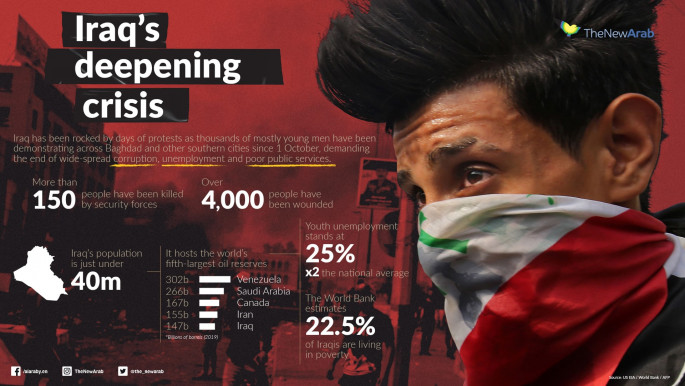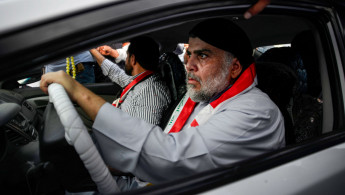Iraq’s Sadr invites rival to join forces against PM
as cleric joins thousands of protesters
Sadr, an ex-militia leader with a cult-like following in swathes of Iraq, has spearheaded demands for Prime Minister Adel Abdel Mahdi's resignation and early parliamentary elections.
"To answer brother Abdul Mahdi, I thought asking you to call an early election would preserve your dignity but as you have refused, I invite brother Amiri to work with me on withdrawing confidence from you immediately," he said in a statement, referring to Hadi al-Ameri, chief of Fatah - the political branch of the Hashd al-Shaabi (PMF) paramilitary force.
Read more: Indepth: 'Our youth are being shot at': Iraq's protests in pictures
 |
The parliament is deeply divided, with Sadr backing protests while second-largest bloc Fatah backs the government.
Several Hashd offices have been torched in recent days in southern Iraq in what observers say is likely an escalation of the rivalry between Sadr and the PMF.
Abdel Mahdi has urged Sadr to agree with Fatah chief Hadi al-Ameri on a way forward.
"If the goal of elections is to change the government, then there is a shorter way: for you to agree with Mr. Ameri to form a new government," the premier wrote in a public letter to the cleric on Tuesday.
"Once this agreement is reached, the prime minister can submit his resignation and the new government can receive its orders in days, if not hours," said Abdel Mahdi.
He dismissed the idea of bringing forward polls, saying, "But the fate of early elections would be unknown. Will its results be definitive?"
'Stay home? No way!'
The chaotic protest movement is unprecedented in Iraq, both because of its apparently independent nature and the ensuing violence.
The first wave of protests starting 1 October left 157 people dead, mostly protesters in Baghdad, according to a government probe which acknowledged "excessive force" was used.
A second wave starting on Thursday has left at least 83 dead.
Overnight, at least one protester was killed in the Shia holy city of Karbala, said the Iraqi Human Rights Commission.
The city's forensics chief told AFP a 24-year-old had been shot in the head, but the governor and security forces said it was "categorically false" anyone had died.
Rallies escalated on Tuesday, with trade unions representing teachers, lawyers and dentists all declaring strikes lasting several days.
In Iraq's southern cities of Hilla, Diwaniyah, Kut and Nasiriyah, most government offices remained closed on Tuesday for lack of staff.
Students gathered in those cities for their third day of demonstrations, ignoring orders by the higher education minister to return to class.
 |
In the capital, protesters were massing on a key bridge linking their main gathering place in Tahrir Square to the Green Zone, where government offices and foreign embassies are based.
They managed to breach a first barrier set up by security forces, who have been holding back demonstrators there in recent days with volleys of tear gas.
Many had spent the night in tents or abandoned buildings in Tahrir in defiance of a curfew declared by the army.
"Their curfew changed nothing," 30-year-old protester Duaa said on Tuesday morning.
"Did the government think we would stay at home? No way."
About 60 percent of Iraq's 40-million population is under the age of 25.
But youth unemployment stands at 25 percent, while one in five people live below the poverty line, despite the vast oil wealth of OPEC's second-largest crude producer.
"We don't want this government any more. We want a transitional government and constitutional change," another female protester said.
"I'm a teacher, I have a salary, I have a house - but the young unemployed people are my brothers and relatives, too."
Among the reforms announced by parliament are the cancellation of financial bonuses for top officials, the dissolution of governorate councils pending elections and the creation of a parliamentary committee to make amendments to the Iraqi constitution.
On Monday, Iraq's parliament speaker Salim Jabouri called on security forces to "protect the lives of protesters and public and private property".
The death toll for the protesters has now passed 100 following weeks of protests, this appeal appears to have gone unheeded.
Agencies contributed to this report.
Follow us on Twitter and Instagram to stay connected





 Follow the Middle East's top stories in English at The New Arab on Google News
Follow the Middle East's top stories in English at The New Arab on Google News


